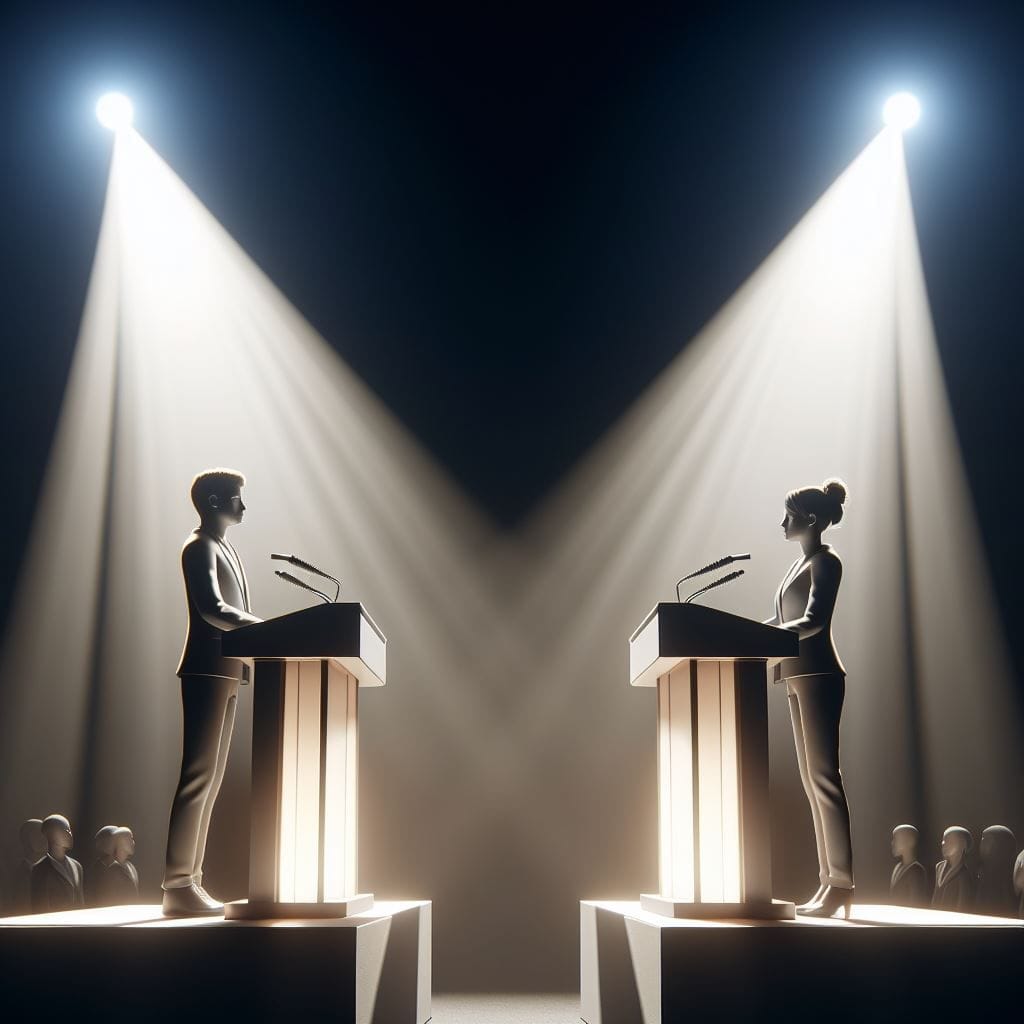How Debates Shape Elections Across the Globe
Political debates: gladiatorial clashes for voters. From image wars (JFK vs. Nixon) to informed voting (Mexico), they force candidates to fight for your vote. Europe joins the fray with “elephant gatherings” and France's history-making duels.

A presidential debate is a quadrennial spectacle, a clash of titans, a battle royale of… PowerPoint presentations? Yes, debates are supposed to be the crucible of informed democracy, the marketplace of ideas where voters, armed with knowledge, choose their leader. But beneath the veneer of reason lurks a fascinating, sometimes bizarre, move between genuine political discourse and reality TV.
Latin America, scarred by the iron fist of dictatorships, knows the value of these debates more acutely. Here, they represent a vibrant return to free speech, a chance to hear competing visions for the future. Voters, for the first time in generations, aren't spoon-fed a singular narrative. They get to witness the clash, to see how candidates handle pressure, to hear not just policy proposals, but also the voice of their convictions.
But here's the rub: effective communication goes back further than policy wonks and attack ads. We're talking ancient Greece, folks. Protagoras, a philosophical OG, knew a weak argument could be bolstered by a skilled tongue. Aristotle, ever the pragmatist, saw persuasion as a three-legged stool: the speaker's character, their ability to evoke emotion, and, of course, eloquence.
Now, picture this: a pristine debate stage, bathed in TV studio light. Here's the catch – the debate's “reliability” hinges on who organizes it, who asks the questions, even where it takes place. Take the Dominican Republic, for instance. Debates are a fledgling concept, a whisper in the political wind. On the other side of the Atlantic, Spain boasts an on-again, off-again debate culture.
The truth is, debates rarely upend a pre-existing landslide. But in those nail-biting races where every vote counts, any misstep can be fatal. Remember the 1960s? The first televised US debate. Richard Nixon, pale and sweaty, his grey suit blending into the black and white scenery, versus a telegenic John F. Kennedy, tanned and sharp in a black suit. Radio listeners crowned Nixon the victor, but TV viewers, swayed by Kennedy's image, propelled him to the White House. Looks, it seems, can be more than skin deep in the age of televised debates.
But let's not get carried away by the glitz and glam. The heart of a debate, the true test of a leader, lies in the power of the word, the swift parry and thrust of well-reasoned arguments. Remember Ronald Reagan, facing down questions about his age in 1984? With a witty quip, he disarmed his opponent and cemented his image as a man in control. That, is the magic (and ruthlessness) of political debate.
Television Triumphs and Twitter Trends
In the heart of Tijuana, amidst the vibrant buzz of the Autonomous University of Baja California, history unfolded. It was not the history of wars fought or treaties signed, but a quieter, yet equally profound narrative – the evolution of Mexican democracy through the lens of presidential debates.
In 2018, over 12.6 million eager eyes tuned in to witness the Second Presidential Debate, an event that captivated television screens and dominated the digital realm with 1.3 million views on YouTube and a flurry of activity on X (formerly known as Twitter) and Facebook. This surge in viewership marked a pivotal moment, reflecting the growing significance of these debates in the Mexican political landscape.
For Mexico, a country mired in political complexity and historical turbulence, the journey towards embracing the culture of presidential debates has been a gradual one. Rewind to 1994, a year etched in the Mexican history for its political turmoil, marked by the emergence of the Zapatista Army of National Liberation and the tragic assassination of presidential candidate Luis Donaldo Colosio. It was against this backdrop of uncertainty that Mexico's inaugural presidential debate unfolded, held within the austere confines of the Technological Museum of the Federal Electricity Commission.
Back then, the rules were stark and rigid. Equal time allocation, no interruptions, and a ban on direct dialogue between debaters characterized the early debates. Moderated by the esteemed journalist Mayté Noriega, these debates served as a tentative step towards transparency and informed decision-making in Mexican elections.
Fast-forward to the present day, and the landscape of presidential debates has undergone a profound metamorphosis. No longer constrained by the shackles of tradition, the debates of today are dynamic, interactive spectacles that serve as a crucible for the exchange of ideas and visions for the future.
As Mexico braces itself for the 2024 electoral showdown, the National Electoral Institute (INE) stands at the helm, orchestrating a series of debates that promise to redefine the contours of political discourse. With flexible formats and an emphasis on citizen participation, these debates transcend mere theatrics, emerging as crucibles of democratic deliberation.
The topics are as diverse as they are pressing – from security and economy to corruption and healthcare, each debate promises to unravel the complexities that define contemporary Mexico. But what truly sets these debates apart is the inclusion of vulnerable groups, the acknowledgment of marginalized voices that often languish on the peripheries of political discourse.
In a bid to democratize the debate process further, the INE has embarked on a nationwide mission, traversing the length and breadth of Mexico to solicit questions directly from citizens. This grassroots approach empowers ordinary Mexicans and ensures that the debates remain rooted in the lived realities of the populace.
But beyond the statistics and the spectacle lies a deeper narrative – one of resilience and evolution. The journey from the rigid confines of 1994 to the fluid dynamism of 2024 is a reassurance to Mexico's unshakable commitment to democracy, a journey marked by trials and triumphs, setbacks and strides.
From Junta Jitters to Political Pugilism
Imagine a continent where the loudest voice belonged not to the people, but to the generals. That was the reality for much of Latin America in the 20th century, a time when democratic discourse was silenced by the jackboots of military regimes. But amidst the somber pronouncements of juntas, a feisty new tradition bloomed – the televised presidential debate. Forget stuffy suits and podiums; this was democracy in its most vibrant, unscripted form, a political cage match where contenders for the highest office went toe-to-toe, not with fists, but with fiery rhetoric and, occasionally, the occasional well-placed zinger.
The story of presidential debates in Latin America isn't a neatly chronological one. It's a quirky tango with history, a dance where steps forward were often followed by retreats under the iron fist of a coup. The first twirl on the dance floor happened in 1960, in the heart of Brazil's exuberant carnival city, Rio de Janeiro. Here, Janio Quadros, a flamboyant politician with a penchant for white hats, charmed his way to victory in a televised debate – a victory, it turned out, that would be short-lived. Four years later, Brazil would succumb to a military coup, ushering in a dark period where not just debates, but democracy itself, was relegated to the shadows.
This wasn't an isolated incident. From Argentina to Chile, a wave of military dictatorships swept across the continent, silencing dissent and turning elections into mere formalities. Countries like Bolivia and Haiti, already familiar with the heavy hand of authoritarian rule, found themselves further isolated from the democratic chorus.
But Latin America has a fighting spirit, a fiery resilience that flickers even in the darkest times. So, when the democracies began to claw their way back in the 1990s, the first thing they dusted off was the forgotten microphone of the debate stage. In Uruguay, after a 15-year hiatus, the crackle of political fireworks filled the airwaves once more. Haiti, with its 19 presidential hopefuls, saw a lively free-for-all organized by the media, a testament to the cacophony of voices that democracy allows.
Argentina, ever the dramatic one, waited until 2015 for its first-ever debate, a historic event that left audiences breathless and politicians slightly ruffled. Peru, on the other hand, embraced the debate culture early on, with a 1990 clash between literary giant Mario Vargas Llosa and the enigmatic Alberto Fujimori setting the stage for future showdowns.
There have been hiccups, of course. Not every politician is a natural on the debate stage. Brazil's Lula da Silva, a charismatic leader on the campaign trail, famously opted out of a debate in 1989. Similarly, Mexico's fiery AMLO (Andrés Manuel López Obrador) gave the 2006 debate a miss.
But these are minor glitches in a story that's fundamentally optimistic. The rise of televised debates in Latin America signifies a continent finding its voice again, a shift from the hushed tones of dictatorship to the lively – and often messy – discourse of democracy. It's a messy, passionate affair, with candidates flinging barbs and audiences hanging on every word. It's democracy, not in its starched suit, but in its dancing shoes, a vibrant display of ideas and personalities that promises a future filled with lively political debates, unconventional characters, and, hopefully, a lot less military intervention.
The Circus of Elephants and Policy
In democracy, few acts capture the public imagination quite like the televised debate. Here, under the harsh glare of spotlights, political gladiators clash, not with swords and sandals, but with barbs and policy pronouncements. But the format of this combat varies wildly across the globe, offering a fascinating glimpse into different political cultures.
Germany's Elephantine Encounter: Move over, Westminster Dog Show, because Germany has its own unique political fauna on display – the “Elefantentreffen” or Elephant Gathering. Here, party leaders, burdened not by tusks but by the weight of expectation, lumber into televised debates. The 2005 clash between the charismatic Schröder and the measured Merkel, watched by a record-breaking audience, is a prime example. Schröder, the media darling, may have won the debate, but Merkel, the underdog, triumphed in the election, proving that sometimes, substance can trump showmanship.
The American Cage Match: Across the pond, debates are a meticulously orchestrated affair, run by the aptly named Commission for Presidential Debates. Funded by corporate titans, it's a system both polished and, some might say, a little too cozy. Imagine two roosters, prepped for battle by their respective handlers, squaring off in a ring built by their sponsors. While it may lack spontaneity, it guarantees a high-profile spectacle.
France's History-Making Zinger: French debates are more than just political dust-ups; they're woven into the very fabric of the nation's history. Who can forget 1988, when Mitterrand, with a sly glint in his eye, addressed Chirac as “monsieur le premier ministre” – a masterstroke that redefined their positions and arguably swayed the electorate? French debates are a high-stakes game of verbal jousting, where a well-placed quip can rewrite the political narrative.
Italy's Participation Paradox: In Italy, electoral debates are a curious form of entertainment. Legally, candidates must be treated equally, but participation remains voluntary. It's as if a school talent show – everyone's invited, but skipping class is always an option. This creates a strange dynamic where everyone claims to want to debate, but ultimately, some choose to stay comfortably backstage.
The Stiff Upper Lip and the Television Tussle: The Brits, ever the traditionalists, were late adopters of the televised debate format. Margaret Thatcher, the Iron Lady herself, famously dismissed the idea as “alien” to British politics. It wasn't until 2010 that the dam finally broke, with Cameron, Clegg, and Brown engaging in a televised tussle. The novelty factor proved a hit, with polls suggesting the debates swayed a significant portion of the electorate.
From the corporate-sponsored cage match to the land of the history-making zinger, the global debate stage offers a window into the soul of different democracies. It's a messy, unpredictable, often hilarious (and sometimes cringe-worthy) display, but ultimately, it's a contribution to the messy, unpredictable, and often hilarious (and sometimes cringe-worthy) business of democracy itself.
Glitz, Gaffe, and Glory in Political Debates
In the presidential debates, two primary pirouettes dominate the stage: the Acclamation and the Attack. The Acclamation is a graceful twirl, where candidates unveil their proposals with the poise of a preening aardvark. The Attack, on the other hand, is a pouncing peacock's strut, designed to peck holes in the opponent's platform and leave them flustered.
A 2010 study, drier than a week-old croissant, found that American debates favor the Acclamation. This can be blamed on the cuddly format: a panel of journalists lob questions like softballs, while a friendly audience smiles encouragingly. This lulls candidates into a state of comfortable self-promotion, more focused on charming the journalists than engaging in a combative duel with their rival.
Compare this to France, where debates are less “showtime” and more “information hour.” Here, a stern moderator throws down topics like gauntlet gloves, encouraging confrontation – mano a mano, without a cheering section. It's a battle of wits, not a popularity contest.
Mexico, bless its fiery spirit, has historically favored the Attack strategy. Debates there are more “cage fight” than “chess match,” with candidates trading barbs faster than you can say “political mudslinging.”
One fascinating peculiarity across these nations (US, Spain, Mexico) is the focus on policy over personality. The spotlight shines brighter on proposals and past political deeds than on a candidate's charisma or penchant for wearing wacky hats.
Now, let's pirouette into the realm of epic debate fails. Scholars, those wise owls perched on dusty tomes, point to unpreparedness as the most soul-crushing misstep. Imagine, if you will, Antanas Mockus, a Colombian presidential hopeful, facing a question about judicial reform. Mr. Mockus, alas, resembled a bewildered deer caught in headlights, his mind a blank canvas where an answer should have been. This, dear reader, is a cautionary tale for all aspiring politicians: know your stuff, or risk appearing like a clueless kangaroo in a calculus class.
Another blunder to avoid? Insults. Yes, even in the fiery world of Mexican politics, resorting to name-calling is like tripping over your own shoelace – not exactly a display of political prowess. Remember, as the great Roman orator Cicero once quipped, “truth will belong to the one who uses the best words.” Instead, ditch the insults and unleash the eloquence of a Shakespearean sonnet instead.
Presidential debates, then, are a complicated balancing act. Candidates must master the art of both Acclamation and Attack, twisting them together with the grace of a hummingbird and the strategic mind of a chess grandmaster. Let's hope for future debates that are as informative as they are entertaining, where ideas clash like cymbals and voters are left with a clear picture of who will lead them into the uncharted territory of the next political term.
In-text Citation: (Espinosa Torres, 2024, pp. 16-19)




